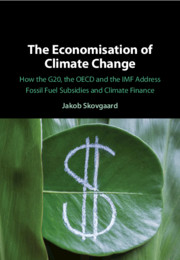 The Economisation of Climate Change
The Economisation of Climate Change Book contents
References
Published online by Cambridge University Press: 11 March 2021
Summary
- Type
- Chapter
- Information
- The Economisation of Climate ChangeHow the G20, the OECD and the IMF Address Fossil Fuel Subsidies and Climate Finance, pp. 241 - 270Publisher: Cambridge University PressPrint publication year: 2021
- Creative Commons
- This content is Open Access and distributed under the terms of the Creative Commons Attribution licence CC-BY-NC-ND 4.0 https://creativecommons.org/cclicenses/
